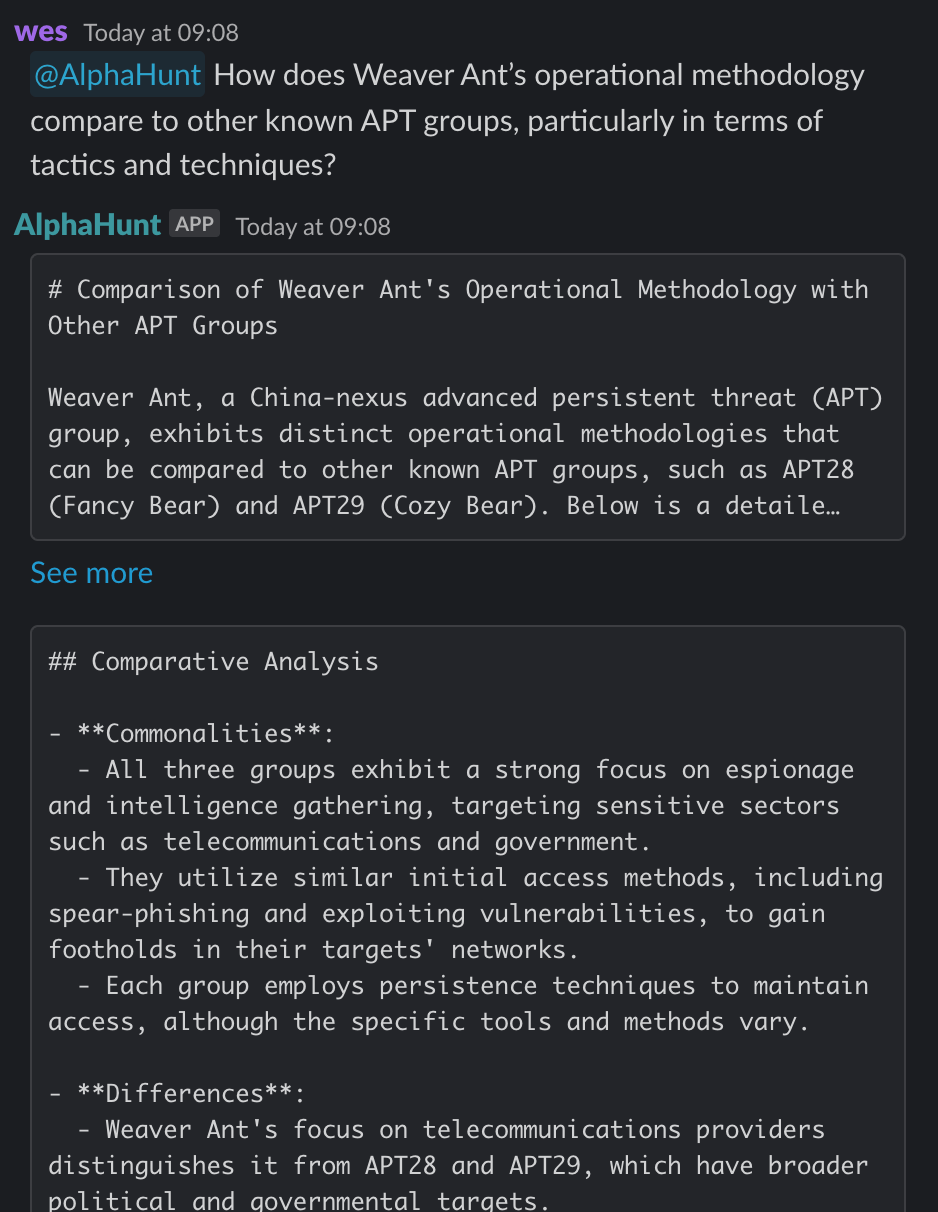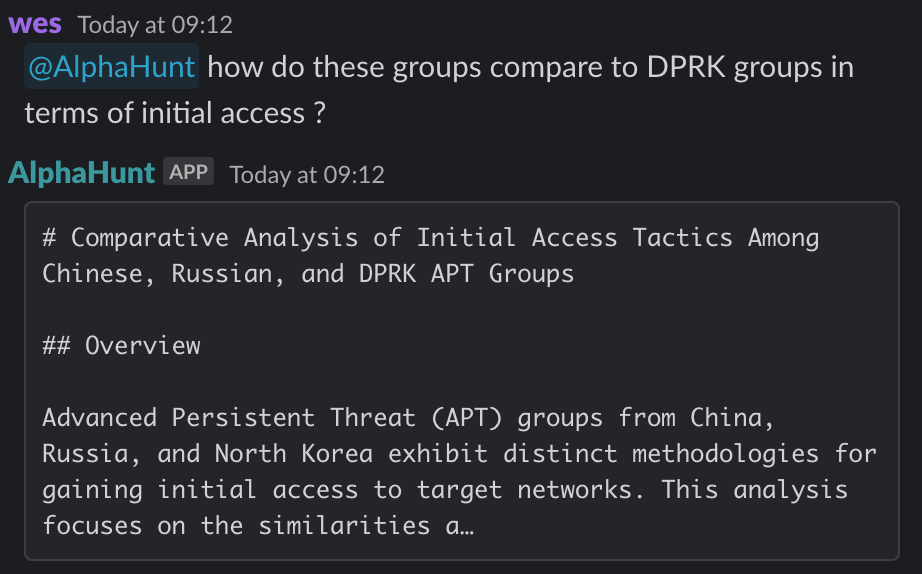Strategic Cyber Threats: Chinese, Russian, and North Korean APTs.. How are they different?
Recent trends indicate a shared interest among these state-sponsored groups in exploiting vulnerabilities and utilizing AI tools like Google's Gemini to improve their cyberattack capabilities.



That moment... you fall down the rabbit hole.
TL;DR
Key Points
-
- Chinese APTs are aligning cyber operations with national economic goals, targeting sectors like biotechnology and semiconductors.
- Implement EDR solutions to detect and mitigate these sophisticated threats.
-
- Russian APTs focus on political influence through credential harvesting and disinformation.
- Strengthen incident response protocols to counteract these short-term disruptive tactics.
-
- North Korean APTs, driven by financial motives, are evolving tactics for cryptocurrency theft.
- Enhance awareness training to recognize social engineering and phishing attempts.
-
- All APT groups exploit vulnerabilities and use AI tools to enhance cyberattack capabilities.
- Regularly update systems and participate in threat intelligence sharing to stay ahead of emerging threats.
Research
The analysis of Advanced Persistent Threat (APT) groups from China, Russia, and North Korea has been refined based on feedback. This report highlights the distinct operational methodologies, TTPs, and motivations of each group, while addressing areas for improvement.
Chinese APTs are strategically targeting sectors aligned with the country's Five-Year Plans, such as biotechnology and semiconductors, using custom-built malware and legitimate software like SoftEther VPN for persistence. Their operations involve extensive reconnaissance and are primarily focused on economic espionage and intellectual property theft.
Russian APTs leverage political events to conduct credential harvesting and disinformation campaigns, often exploiting one-day vulnerabilities. Their operations are characterized by high-profile, short-term disruptions aimed at cyber espionage and undermining adversaries.
North Korean APTs, particularly the Lazarus Group, are financially motivated, engaging in cryptocurrency theft and using advanced social engineering tactics. They exploit outdated vulnerabilities for long-term persistence and are increasingly using AI tools to enhance their operations.
Recent trends indicate a shared interest among these state-sponsored groups in exploiting vulnerabilities and utilizing AI tools like Google's Gemini to improve their cyberattack capabilities. The report recommends implementing advanced endpoint detection and response solutions, establishing rigorous patch management processes, and developing comprehensive incident response protocols. Additionally, it emphasizes the importance of targeted awareness training and active participation in threat intelligence sharing platforms to mitigate the risks posed by these APT groups.
Chinese APT Groups
-
TTPs:
-
Behavioral Characteristics: Chinese APTs align operations with the Chinese government's Five-Year Plans, targeting sectors like biotechnology, semiconductors, and renewable energy.
-
Malware: Commonly used malware includes custom-built tools and zero-day exploits. Recent reports indicate the use of legitimate software like SoftEther VPN for persistence, allowing attackers to blend into legitimate traffic.
-
Operational Phases: Extensive reconnaissance is conducted, often involving months of preparation. For example, the Cloud Hopper attack involved infiltrating managed IT service providers to access client networks.
-
Recent Activities: Groups like MirrorFace have expanded their target lists to include organizations in the European Union, employing spear-phishing tactics related to significant events (e.g., EXPO 2025).
-
-
Strategic Objectives:
- Focused on economic espionage, intellectual property theft, and gaining technological advantages to support national interests.
Russian APT Groups
-
TTPs:
-
Political Influence: Russian APTs leverage political events to enhance operations, often engaging in credential harvesting and disinformation campaigns.
-
Malware: They exploit one-day vulnerabilities in webmail servers and utilize spear-phishing emails containing cross-site scripting exploits.
-
Operational Phases: Russian groups often execute high-profile, short-term disruptions, contrasting with the more patient approach of North Korean APTs.
-
-
Strategic Objectives:
- Aimed at broad-scope cyber espionage, suppression of dissent, and undermining adversaries, particularly in geopolitical contexts.
DPRK APT Groups
-
TTPs:
-
Financial Motivations: North Korean APTs, particularly the Lazarus Group, engage in financially motivated cybercrime, including cryptocurrency theft, to fund state activities.
-
Malware Delivery: They employ advanced social engineering tactics, such as the DEV#POPPER campaign targeting developers, and exploit outdated vulnerabilities for long-term persistence.
-
Emerging Tactics: Groups like Emerald Sleet are using new methods, such as tricking targets into executing PowerShell commands to gain access.
-
-
Strategic Objectives:
- Focused on generating revenue through cybercrime, bypassing international sanctions, and conducting espionage to support the regime.
Similarities Among APT Groups
-
Common Operational Methodologies: All three groups engage in extensive reconnaissance and utilize social engineering tactics to gain initial access to target networks.
-
Motivations: While their primary objectives differ (economic espionage for China, political influence for Russia, and financial gain for North Korea), all groups share a common goal of undermining adversaries and enhancing their national interests.
Recent Trends
-
Exploitation of Vulnerabilities: A recent unpatched Windows zero-day flaw has been exploited by multiple state-sponsored groups, including those from China, Russia, and North Korea, indicating a shared interest in leveraging vulnerabilities for data theft and espionage.
-
Use of AI Tools: State-sponsored APTs are increasingly utilizing AI tools like Google's Gemini to enhance their operational capabilities across various phases of cyberattacks. This includes reconnaissance, tool weaponization, and post-compromise activities.
Recommendations, Actions, Suggested Pivots, Forecasts and Next Steps..
(Subscribers Only)




![[DEEP RESEARCH] BadIIS Isn’t Enough: The IIS Module + HTTP Fingerprints That Catch SEO-Fraud Cloaking](/content/images/size/w600/2026/02/z-2.png)
